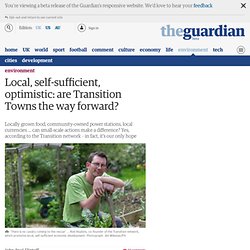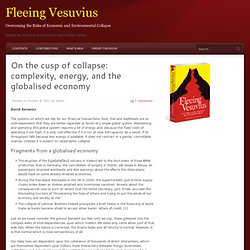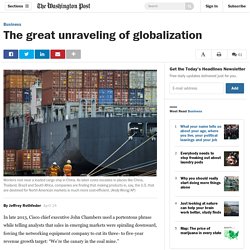

Local, self-sufficient, optimistic: are Transition Towns the way forward? Late last year, Rob Hopkins went to a conference.

Most of the delegates were chief executive officers at local authorities, but it was not a public event. Speaking in confidence, three-quarters of these officials admitted that – despite what they say publicly – they could not foresee a return to growth in the near future. "One said: 'If we ever get out of this recession, nothing will be as it was in the past,'" Hopkins recalls. "Another said: 'Every generation has had things better than its parents.
Not any more.' Shocking stuff – shocking enough to leave many people feeling hopeless. For instance, a Transition group in Brixton raised £130,000 to install the UK's first inner-city, community-owned power station, consisting of 82kW of solar panels on top of a council estate. What he is arguing is that sweeping changes in history are made not only by "big" people doing big things but by groups of "ordinary" people doing smaller things together.
How a New Sustainability Movement Is Conquering America, One Town at a Time. Photo Credit: Shutterstock.com/silver-john June 11, 2013 | Like this article?

Join our email list: Stay up to date with the latest headlines via email. When I set out to investigate the appeal of Transition, a sustainability movement that has spread to 1,105 towns in 43 countries over the past eight years, I started with what I thought was a basic question: What are “Transition Towns” transitioning to? “Resilience,” I was told. Such bucolic but fuzzy visions are typical of Transition, which is more about shifting paradigms than prescribing solutions. Opening Pandora's Box : The New Wave of Land Grabbing by the Extractive Industries.
The Three Uses of Glocalization. "Glocalization," Regionalism and District Elections. The Challenge of Glocalization The recent "Battle in Seattle" exposed the contradictions between the globalization of capital and the devolution of political power.

San Francisco labor union members, environmentalists, and consumer advocates joined thousands of other activists to protest the World Trade Organization (WTO) meeting in Seattle. They demanded greater public access to the WTO's elite decision-makers and insisted that human rights and social justice be given the same priority as property rights in making trade liberalization agreements. The WTO (like NAFTA, GATT, and other supranational regulatory authorities) was created by national governments at the behest of multinational corporations and financiers to promote and enforce free trade.
Not only did that act of creation require a partial surrender of national sovereignty, it imposed restrictions on state and local governments inclined to meddle with the new world order. Why We Can't Shop Our Way to a Better Economy: Stacy Mitchell at TEDxDirigo. Chris Hedges: Sacrifice Zones of America. On the cusp of collapse: complexity, energy, and the globalised economy. Posted on October 8, 2011 by admin David Korowicz The systems on which we rely for our financial transactions, food, fuel and livelihoods are so inter-dependent that they are better regarded as facets of a single global system.

Maintaining and operating this global system requires a lot of energy and, because the fixed costs of operating it are high, it is only cost-effective if it is run at near full capacity. As a result, if its throughput falls because less energy is available, it does not contract in a gentle, controllable manner. Instead it is subject to catastrophic collapse. Fragments from a globalised economy. Robert Neuwirth: The power of the informal economy. What is the Informal Economy & Why Should You Care?
The “informal economy” is shorthand for a host of different under-the-radar, non-recognized, untracked, unsanctioned, disregarded, and often disparaged commercial activities taking place all around the world, in both emerging and developed markets.

This includes everything from street vending to P2P networks to DIY exchanges, alternative currencies, and ad-hoc entrepreneurship. Hernando De Soto - Capitalism at Crossroads. Naomi Klein on Global Neoliberalism. Triangle Shirtwaist Fire: The Race to the Bottom. Where Ships and Workers Go to Die. Lisa Kristine: Glimpses of modern day slavery. The great unraveling of globalization. In late 2013, Cisco chief executive John Chambers used a portentous phrase while telling analysts that sales in emerging markets were spiraling downward, forcing the networking equipment company to cut its three- to five-year revenue growth target: “We’re the canary in the coal mine.”

It was meant to be a candid assessment of the instability in global markets. But rather than being the harbinger of danger, Cisco was just the latest victim of globalization, the tantalizing but perilous business principle that has — quietly — counted among its casualties some of the world’s largest companies. Indeed, although multinational executives avoid talking about it publicly, profits in global markets are underwhelming — and doing business internationally is full of unanticipated risks. That’s a far cry from the way globalization was pitched, as the strategic imperative du jour nearly two decades ago. It was supposed to act like a rising tide, lifting all boats in poor and rich countries alike.